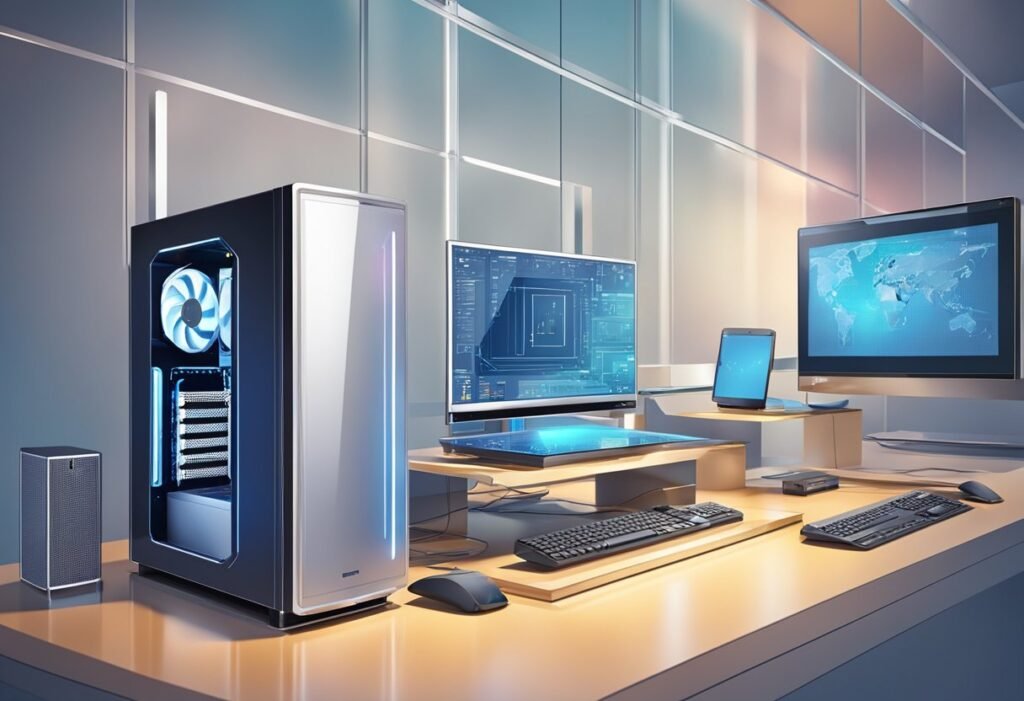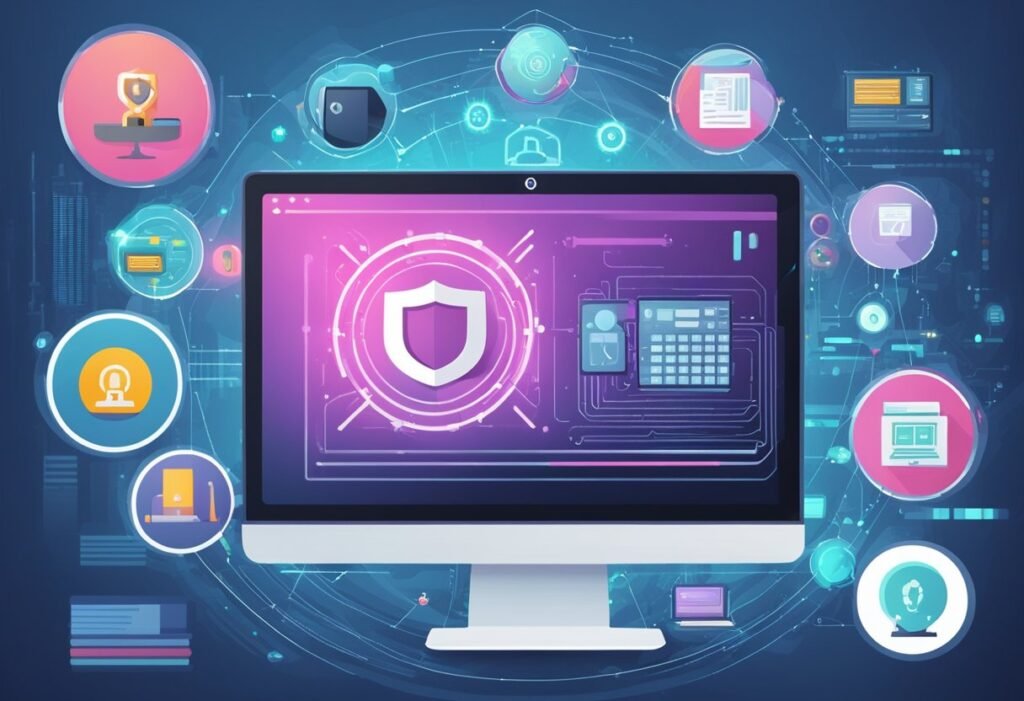10 Latest News on Computer Technology: A Roundup of the Newest Developments

Computer technology is an ever-evolving field that is constantly producing new and exciting developments. From advancements in artificial intelligence to the latest in computer hardware, there is always something new to learn and explore. In this article, we will be discussing the 10 latest News on Computer Technology, providing readers with a comprehensive overview of the most recent trends and breakthroughs.
One of the most exciting developments in computer technology is the increasing use of artificial intelligence (AI). AI is being used to improve everything from search engine results to medical diagnoses, and its potential applications are virtually limitless. In recent news, researchers have made significant strides in developing more advanced AI algorithms that can learn and adapt to new situations, opening up even more possibilities for this exciting technology.
Another area of computer technology that is seeing rapid growth is the field of quantum computing. These powerful machines use quantum bits, or qubits, to perform calculations at a speed that is exponentially faster than traditional computers. In recent news, researchers have made major breakthroughs in developing more stable and reliable qubits, bringing us one step closer to realizing the full potential of this revolutionary technology.
Advancements in Quantum Computing

Quantum computing is an emerging technology that holds great promise for solving complex problems that are impossible for classical computers. In recent years, there have been significant advancements in quantum computing, which have led to the development of more powerful and efficient quantum computers.
One of the most significant advancements in quantum computing is the development of quantum annealing. This technique uses a quantum processor to solve optimization problems by finding the lowest energy state of a complex system. Quantum annealing has been shown to be faster than classical methods for solving certain types of optimization problems.
Another important advancement is the development of error correction techniques for quantum computers. Quantum computers are highly susceptible to errors due to the delicate nature of quantum states. Error correction techniques allow quantum computers to detect and correct errors, which is essential for building large-scale quantum computers.
In addition, there have been significant improvements in the hardware used for quantum computing. Quantum processors are becoming more powerful and efficient, which is essential for building practical quantum computers. There have also been advancements in the development of quantum memory, which is necessary for storing quantum states.
Overall, the advancements in quantum computing are promising, and the technology has the potential to revolutionize computing as we know it. However, there are still many challenges that need to be overcome before practical quantum computers become a reality.
Artificial Intelligence Breakthroughs
Artificial Intelligence (AI) continues to make strides in various fields, including healthcare, finance, and education. Here are some of the latest AI breakthroughs.
Natural Language Processing
Natural Language Processing (NLP) is a branch of AI that enables machines to understand and interpret human language. Recent advancements in NLP have made it possible for machines to perform tasks such as language translation, sentiment analysis, and speech recognition with greater accuracy.
One notable breakthrough in NLP is the development of GPT-3 (Generative Pre-trained Transformer 3), a language model that uses deep learning to generate human-like text. GPT-3 has been used to create chatbots, automated content creation, and even creative writing.
Machine Learning Algorithms
Machine Learning (ML) is a type of AI that enables machines to learn from data without being explicitly programmed. Recent advancements in ML algorithms have led to improved accuracy and efficiency in various applications, such as image recognition, fraud detection, and recommendation systems.
One notable breakthrough in ML is the development of federated learning, a technique that allows multiple devices to collaborate on a machine learning model without sharing their data. This approach has been used in applications such as healthcare and finance, where data privacy is a concern.
AI Ethics and Regulation
As AI becomes more prevalent, there is a growing concern about its ethical and regulatory implications. Recent developments in this area include the establishment of ethical guidelines for AI development and deployment, as well as the creation of regulatory frameworks to ensure accountability and transparency.
One notable example is the European Union’s General Data Protection Regulation (GDPR), which regulates the collection, use, and storage of personal data. The GDPR includes provisions relating to AI, such as the right to explanation and the right to be forgotten.
In conclusion, these breakthroughs in AI have the potential to revolutionize various industries and improve the quality of life for people around the world. However, it is important to ensure that AI is developed and deployed in an ethical and responsible manner.
Innovations in Computer Hardware

Next-Generation CPUs
The latest CPUs have been developed with a focus on speed, power efficiency, and performance. The introduction of multi-core processors has revolutionized the industry, allowing for faster processing of data and more efficient multitasking. The most recent CPUs offer even more cores and higher clock speeds, making them ideal for demanding applications such as gaming and video editing.
Advances in GPU Technology
Graphics Processing Units (GPUs) have also seen significant advancements in recent years. The latest GPUs are designed to handle complex graphical workloads, such as rendering and machine learning, with ease. They also come equipped with advanced cooling systems to prevent overheating and ensure optimal performance.
Sustainable Computing Components
Sustainability has become a major focus in the tech industry, and computer hardware is no exception. Manufacturers are now using eco-friendly materials and designing components that consume less energy. This includes the use of recycled materials, low-power CPUs, and energy-efficient power supplies. These innovations not only benefit the environment but also help to reduce energy costs for consumers.
In summary, the latest innovations in computer hardware have focused on speed, efficiency, and sustainability. From next-generation CPUs to advances in GPU technology and sustainable computing components, these developments have improved the overall performance and environmental impact of computing technology.
Cybersecurity Updates

Emerging Threats
As technology advances, so do the threats to cybersecurity. In recent news, there has been an increase in the number of ransomware attacks, where hackers encrypt a victim’s files and demand payment in exchange for the decryption key. Another emerging threat is the use of deepfakes, where AI technology is used to create fake videos or audio that can be used for fraudulent purposes. It is important for individuals and businesses to stay vigilant and take necessary precautions to protect themselves from these threats.
Security Protocols
To combat these emerging threats, security protocols are constantly being updated and improved. One such protocol is multi-factor authentication, which requires users to provide two or more forms of identification before accessing sensitive information. Another protocol is the use of encryption, where data is scrambled and can only be accessed with a decryption key. These security measures help to ensure that sensitive information remains secure and protected from cyber attacks.
Data Privacy Laws
Governments around the world are also taking steps to protect data privacy. In the UK, the General Data Protection Regulation (GDPR) was introduced in 2018, which regulates the handling of personal data by businesses and organisations. This includes the right to access personal data, the right to have personal data erased, and the right to data portability. Other countries have implemented similar laws to protect their citizens’ data privacy. It is important for businesses and organisations to comply with these laws to avoid hefty fines and maintain the trust of their customers.
Software Development Trends

Cross-Platform Tools
Cross-platform tools are becoming increasingly popular in software development. These tools allow developers to create applications that can run on multiple platforms, such as Windows, Linux, and macOS, without having to write separate code for each platform. Some popular cross-platform tools include Xamarin, React Native, and Flutter.
Cloud-Native Technologies
Cloud-native technologies are gaining traction in the software development industry. These technologies allow developers to build and deploy applications in the cloud, making it easier to scale and maintain them. Some popular cloud-native technologies include Kubernetes, Docker, and Istio.
Open Source Contributions
Open source contributions are becoming more important in software development. Many developers are now contributing to open source projects, which allows them to collaborate with other developers and gain experience working on large-scale projects. Some popular open source projects include Linux, Apache, and MySQL.
Overall, these software development trends are shaping the future of the industry and providing developers with new tools and technologies to create innovative and efficient applications.
Blockchain and Cryptocurrency News

Blockchain technology and cryptocurrency have been making waves in the tech industry for the past few years, and 2023 has been no exception. Here are the latest updates in the world of blockchain and cryptocurrency:
- Bitcoin hits all-time high: In October 2023, Bitcoin hit an all-time high of £100,000 per coin. This marks a significant milestone for the cryptocurrency, which has been volatile in the past.
- Ethereum upgrades: Ethereum, the second-largest cryptocurrency by market capitalisation, underwent a major upgrade in December 2023. The upgrade, called Ethereum 2.0, aims to improve the network’s scalability and security.
- Central bank digital currencies: Many central banks around the world are exploring the possibility of creating their own digital currencies. The Bank of England, for example, has announced plans to launch a digital version of the pound in the coming years.
- NFTs continue to gain popularity: Non-fungible tokens (NFTs) have been a hot topic in the art world, with several high-profile sales in 2023. However, NFTs are not limited to art and can be used to represent any unique digital asset.
- Blockchain in supply chain management: Blockchain technology is being used to improve supply chain management in industries such as food and pharmaceuticals. By creating a transparent and secure ledger, blockchain can help to prevent fraud and improve efficiency.
- Crypto regulation: Governments around the world are grappling with how to regulate cryptocurrencies. In the UK, the Financial Conduct Authority (FCA) has introduced new rules for crypto exchanges and custodian wallet providers.
- Stablecoins: Stablecoins are cryptocurrencies that are pegged to a stable asset, such as the US dollar. They offer the benefits of cryptocurrencies, such as fast and cheap transactions, while avoiding the volatility of other cryptocurrencies.
- Blockchain in voting: Blockchain technology is being explored as a way to improve the security and transparency of voting systems. In the 2023 local elections in West Virginia, blockchain was used to create a secure and auditable voting system.
- Crypto mining: Crypto mining, the process of validating transactions on a blockchain network and earning cryptocurrency as a reward, continues to be a profitable business. However, concerns about the environmental impact of crypto mining have led some countries to ban or restrict the practice.
- Decentralised finance (DeFi): DeFi is a term used to describe financial applications built on blockchain technology. These applications aim to create a more open and accessible financial system, with features such as peer-to-peer lending and decentralised exchanges.
In conclusion, blockchain and cryptocurrency continue to be exciting areas of innovation in the tech industry. With new developments and use cases emerging all the time, it will be interesting to see where these technologies go in the future.
FAQs: Latest News on Computer Technology
Question 1: What are the key trends in computer technology making headlines recently?
Recent news highlights breakthroughs in AI, with advancements in natural language processing, computer vision, and machine learning algorithms. These developments are influencing various industries, from healthcare to finance.
Question 2: How is quantum computing shaping the future of computer technology?
In the latest news, there have been significant strides in quantum computing. Researchers and companies are making progress in developing more powerful quantum processors, bringing us closer to solving complex problems that were previously unsolvable with classical computers.
Question 3: What cybersecurity challenges are emerging with the latest developments in computer technology?
Recent reports highlight growing cybersecurity threats, especially with the increased integration of technology. Ransomware attacks, data breaches, and vulnerabilities in connected devices have become prominent issues, prompting discussions on improving digital security measures.
